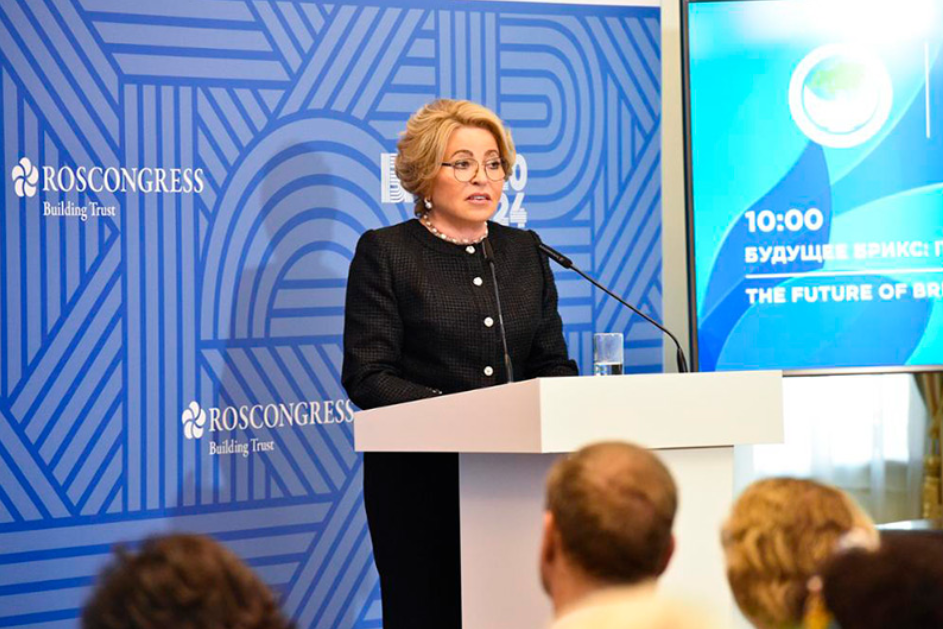By Joke Kujenya, Nigeria
THOUSANDS OF women gathered in St. Petersburg, Russia, not just to attend a conference but to make their voices heard.
From every corner of the globe, the women from 126 countries, brought their diverse experiences, hopes, and concerns to the 4th Eurasian Women’s Forum.
It was organized by the Federation Council of the Federal Assembly of the Russian Federation and the Interparliamentary Assembly of Member Nations of the Commonwealth of Independent States, with support from the Roscongress Foundation.
Unity in Diversity
On Wednesday, September 18 to Friday, September 20, 2024, Russia’s second-largest city, St Petersburg, became a melting pot of female advancement.
Over 3,000 women leaders arrived, representing nations from all continents, including Algeria, Bosnia, Colombia, Ghana, Nigeria, and sundry more.
Their collective mission was clear—collaborate on global issues ranging from economic challenges to peace-building initiatives.
The excitement in the air was palpable as women checked into the forum, exchanging warm greetings and business cards.
It wasn’t just about networking but about building lasting bonds that could extend beyond the boundaries of Russia.
Many expressed a shared commitment to continue advancing women’s causes in their respective countries.
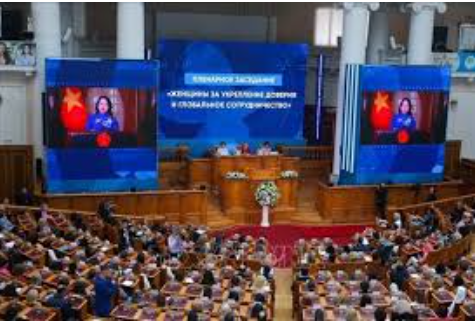
President Putin’s Celebrates Women
In a moment that surprised many, Russian President Vladimir Putin addressed the forum with a rare warmth and humour.
Known for his stern demeanour, Putin lightened the room by greeting both men and women present with a warm “Friends,” sparking laughter among the attendees.
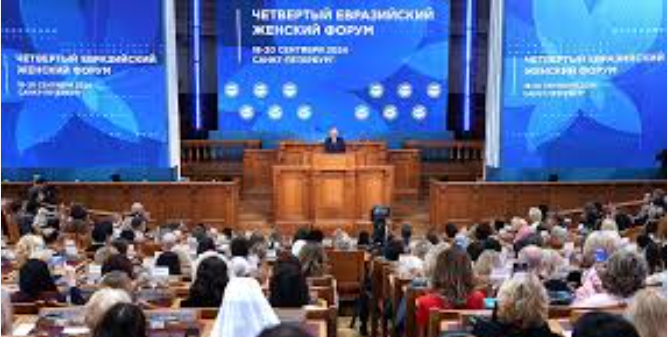
Right on the podium of the Tavrichesky Palace, Putin’s speech acknowledged the power and importance of women’s contributions to global peace and security. He called them “our mothers.” And instantaneous applauses that lasted about 60 seconds followed that with gleaming smiles on the women’s faces.
“We cannot achieve progress without women,” he said, emphasizing how female leaders play a vital role in shaping the world’s future.
Putin highlighted the immense contribution of Russian women in improving the quality of life, supporting families, and upholding traditional values.
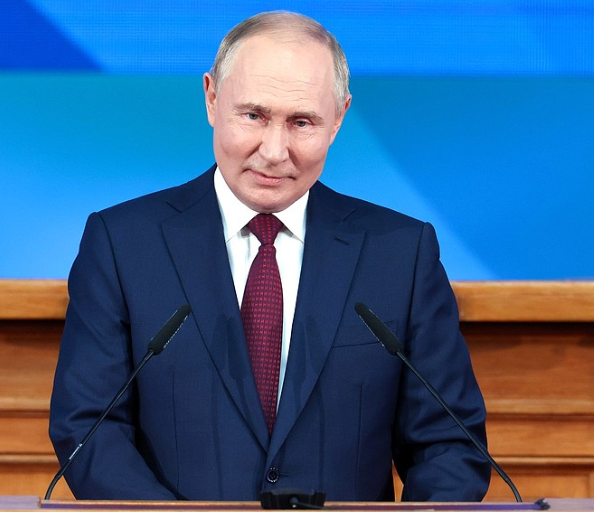
His words resonated deeply with the audience, many of whom were involved in similar projects back home.
He praised women’s resilience in balancing professional success with family responsibilities, pointing out that over six million Russian women now run their own businesses.
His session was applauded with hearty cheers and loud claps with standing ovations. Then, he took his leave unceremoniously.
Conversations that Matter
The forum wasn’t just a collection of speeches and panels. It was a crucible for ideas.
During the plenary sessions at the exquisite Tavrichesky Palace, the women delved into some of the most pressing challenges of our time.
Under the theme “Women Shaping a New Agenda for Peace and Trust,” discussions focused on the roles of women in technological innovation, social well-being, quality media, food security, and the preservation of cultural traditions.
Other sessions, held in various smaller halls, were equally incisive, with participants sharing stories from their countries and drawing upon their unique perspectives to come up with precise solutions that could change the narratives for less privileged women.
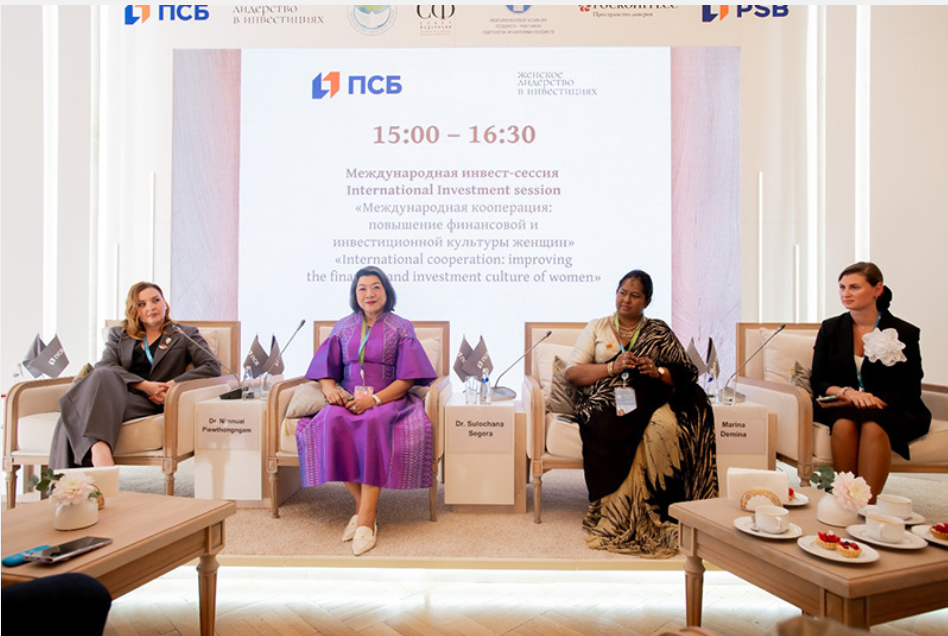
From Gabon to Nigeria to Thailand, the contributions were as diverse as the nations they represented. These women weren’t just participants—they were core changemakers just as fresh attendees also gained insights into how they could go play their own roles in their respective countries.
A Forum with Purpose
The EAWF was not just about dialogue; it was also a direct call on the individual women in attendance to action.
Indeed, Putin’s speech echoed the sentiment that this forum transcended typical discussions of women’s roles in society. It was a platform for real, actionable change.
Women leaders from Brazil, Russia, India, China and South Africa (BRICS) nations, Asia-Pacific Economic Cooperation (APEC), and the Women 20 (W20), among others, took diverse dais to discuss how their initiatives were creating tangible impacts across the globe.
Whether it was fighting poverty or driving technological innovation, each thematic sessions left participants inspired to take their newly found EAWF ideas back to their countries and communities.
Women’s Multifaceted Roles in Society and Diplomacy
Despite the higher level of employment, women skillfully combine high results in their professional activities with motherhood and family responsibilities, the vice speaker of the Federation Council emphasized.
On the sidelines of the Forum, Deputy Chairperson of the Federation Council Inna Svyatenko held a thematic session titled “The Mission of Women: from Motherhood to Serving the World.”
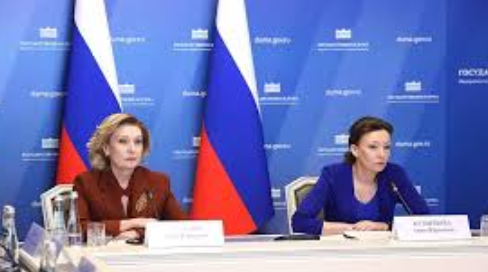
According to Svyatenko, women contribute significantly to various fields, including peacekeeping missions, protecting citizen rights, and serving their country.
“We have gathered here to discuss the unique roles of women in society, as well as to exchange experiences in serving peace,” she noted.
The session featured State Secretary and Deputy Minister of Defense of Russia, Anna Tsivileva, who highlighted the special role of women in Russia.
“We all perceive the Motherland as a mother who preserves the memory of our ancestors, providing us a sense of security and safety. Throughout history, women have supported men and participated in the defense of their country.
“Today, they serve as volunteers, work in hospitals, and engage in the SVO zone. The Fatherland Defenders Foundation has seen 400 mothers and wives of our heroes become social coordinators, many of whom have faced personal losses but found the strength to assist others.
“Women also protect their families; this is their vital mission. We must honour their memory and ensure they occupy a significant role in society’s development,” Tsivileva said.
Major General of Justice Elena Dunaeva discussed the importance of maintaining a balance between family and work. Meanwhile, Elham Aminzadeh, Advisor to the Iranian Minister of Foreign Affairs and Vice-Rector for International Affairs of the University of Tehran, addressed the growing number of women pursuing education in international relations and law, which enhances their professional growth and participation in diplomacy.
Ariane Carol Bauer, Regional Director for Europe and Central Asia of the International Committee of the Red Cross, shared insights on the implementation of humanitarian missions from a female perspective. Major General of Justice Natalia Agafieva emphasized the necessity of state support for women balancing professional and family responsibilities, discussing current and needed measures.
The Chairperson of the Belarusian Union of Women, Olga Shpilevskaya, also contributed to the discussions. Elena Prokhorenko, a police major and deputy company commander of the first special police regiment in Moscow, spoke about family dynasties and their influence on professional choices.
Daria Svetyash, a participant in the “Time of Heroes” program, expressed gratitude for the mentorship she received, which allowed her to gain experience in public activity and contribute to her country’s development.
Cadets from various nations, such as Vu Thi Lan from Vietnam studying at the S. M. Kirov Military Medical Academy in St. Petersburg, shared their experiences on the importance of international education opportunities.
Awards for Many Women
In another setting, Valentina Matviyenko, Chairperson of the Federation Council, participated in the award ceremony for laureates of the Public Recognition Prize, established by the Council of the Eurasian Women’s Forum.
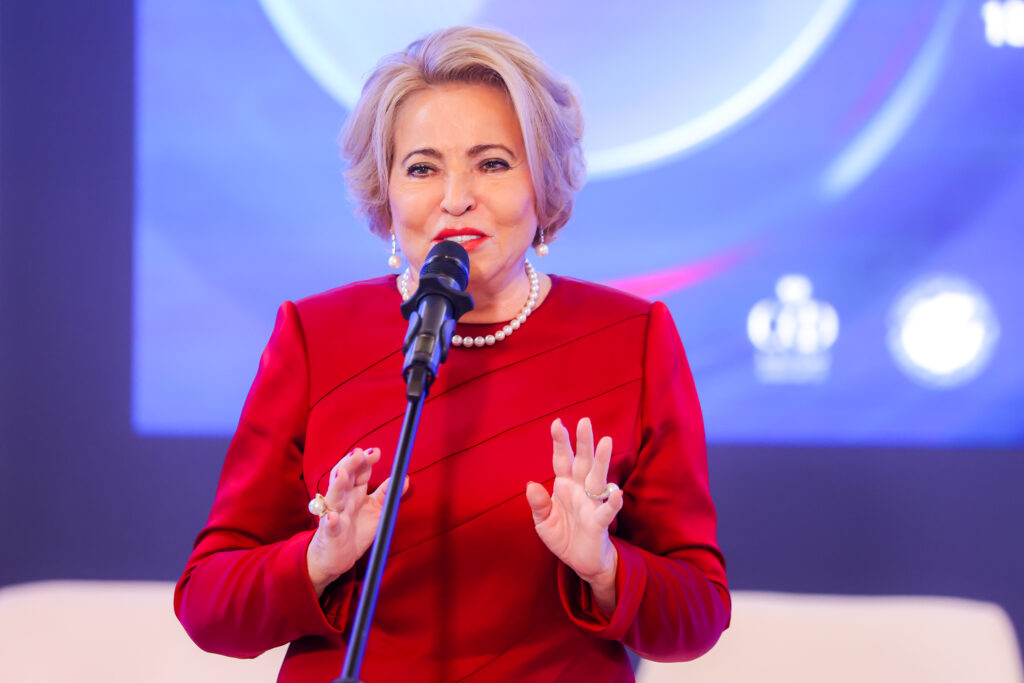
The prize honours women who have made notable contributions to sustainable development, peace, and social activities. Matviyenko emphasized that the award symbolizes the EAWF and recognizes women who inspire others globally.
This year’s winners included prominent figures like Natalya Kochanova, Mabel Chinomona, Nelly Mutti, Veronika Skvortsova, and Anna Tsivileva, among others.
Matviyenko proposed creating a digital honor board showcasing all award recipients on the EAWF official website.
During the final plenary session, Matviyenko noted that the forum set new records in participation, topics, and event levels.
She emphasized the invaluable contributions of women to peace, stability, and international relations, highlighting the growing interest in the forum, which drew representatives from 126 countries and 21 international organizations.
Deputy Chairman Konstantin Kosachev presented the Forum’s Final Document, which calls for women’s voices to be heard in establishing a just world order.
The forum’s strategic partners included the Ministry of Agriculture of Russia and Sberbank, among others, while its strategic information partners encompassed various media outlets, including Russia Today and TASS.
The report concludes with the introduction of the “Embassy of the Future” project, aimed at including foreign schools in children’s diplomacy.
During the session “Dialogue of Generations: Transformation of Women’s Leadership,” experts from around the globe shared successful practices for supporting young women teachers and expanding their roles in public diplomacy.
The Road Ahead
The forum concluded with a clear message: Women must remain at the forefront of global development.
Whether tackling poverty, inequality, or climate change, the energy and drive of these women were undeniable.
The forum served as a testament to the idea that a better world can only be achieved when women are given the space to lead.
As they packed their bags and exchanged final farewells, there was a sense of solidarity.
These women would return home, not just with memories of St. Petersburg, but with a renewed determination to shape the future.
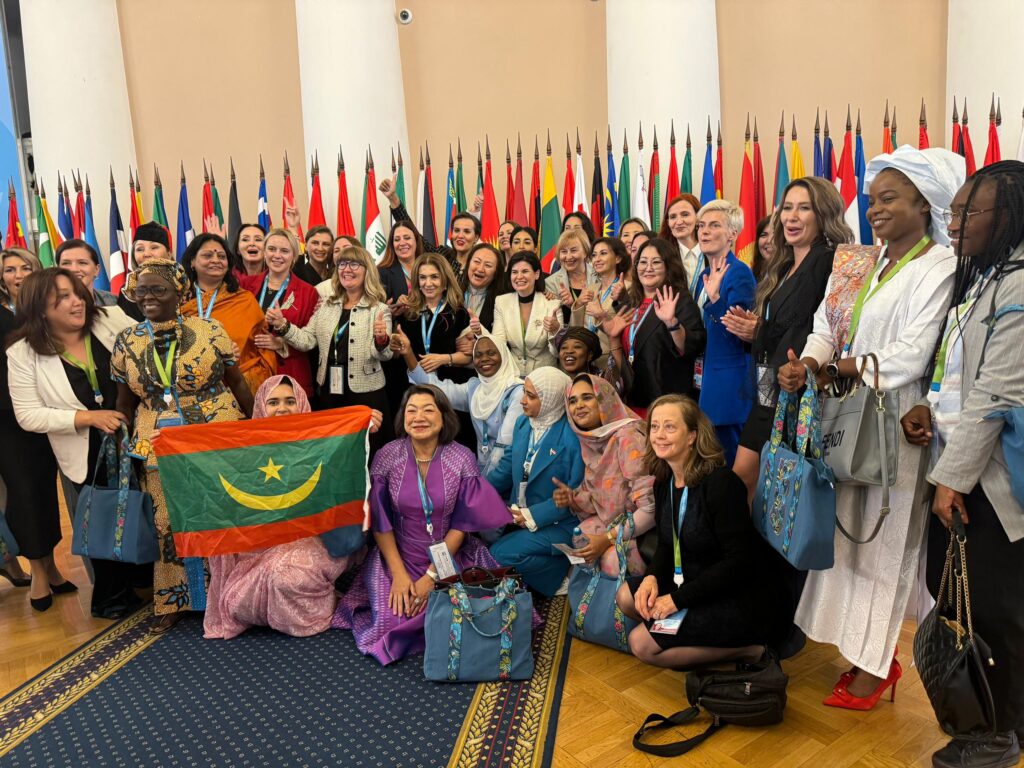
Matviyenko Presents Outcomes of IV EWAF to Federation Council
Five days after the EAWF wrapped up, Valentina Matviyenko, the Chairperson of the Russian Federation Council, addressed the 575th plenary session with high praise for the event.
She acknowledged the forum’s global significance, noting its wide international participation—representatives from 126 countries attended, with over 100 activities held as part of the main programme.
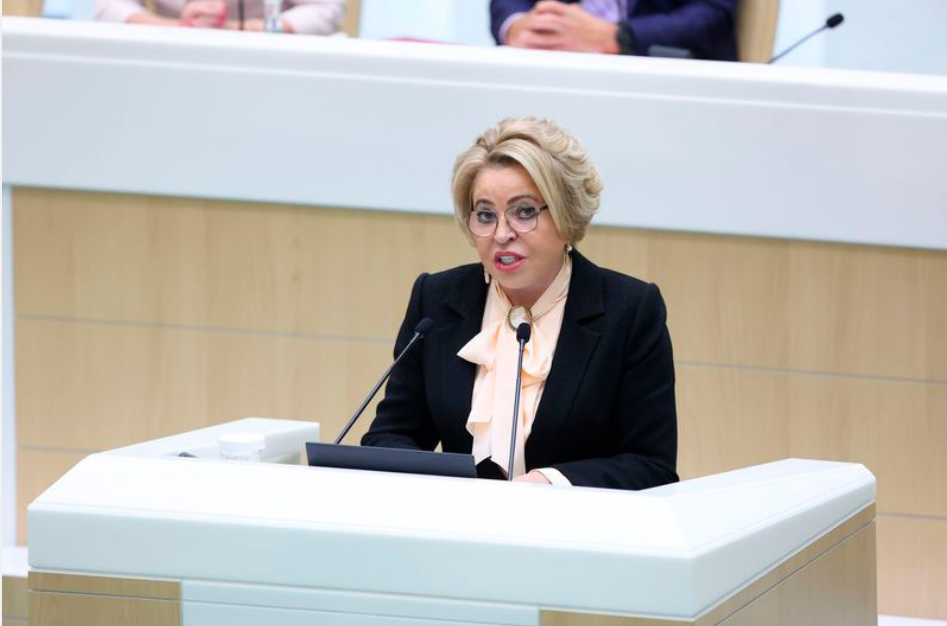
Among these, the first-ever BRICS Women’s Forum stood out.
She noted that the involvement of Russian President Vladimir Putin elevated the forum’s status, which included a comprehensive business programme consisting of more than 300 events.
Senator Galina Karelova, Chairperson of the EWF Council, emphasized that the forum’s agenda aligned with the global public demand for women’s enablement.
She pointed to the massive online engagement, including over 5.5 million views on the Eurasian Women’s Forum page on VKontakte, a popular social network in Russia.
Karelova attributed the forum’s success to a collective effort, expressing deep gratitude to Matviyenko for championing the women’s agenda and offering unwavering support at every level.
She also extended her thanks to the government, various ministries, senators, Roscongress, and other partners, alongside the Federation Council’s press service, for their contributions in making the forum a triumph.
One of the event’s standout achievements was its new business programme formats.
She stressed the introduction of platforms like the Business Center and Investment Lounge facilitated meaningful connections among entrepreneurs, investors, and those showcasing Russian export products.
The festival aspect, “Women for the Preservation of Traditions,” was particularly memorable.
Participants enjoyed competitions, awards, flash mobs, and ethnocultural presentations, which highlighted the rich diversity of the women present, creating an unforgettable experience.
Significantly, the first BRICS Women’s Forum took place during the event, hosting meetings of ministers responsible for women’s affairs from the BRICS nations.
Additionally, women leaders from various sectors, including agriculture, gathered for discussions, alongside the inaugural BRICS Civil Council meeting and an open session of the BRICS Women’s Business Alliance.
The forum also featured a continuation of well-established traditions, including a session of the Women’s 20, a meeting of the International Club of Winners of the APEC Women’s Entrepreneurial Projects competition, and dialogues between women from Russia, Africa, and the Arab world.
Karelova announced that a final document summarizing the forum’s outcomes would be sent to the United Nations (UN) and world leaders, marking another milestone for the Eurasian Women’s Forum.



